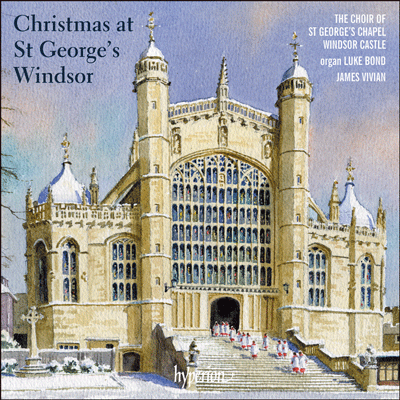The Choir of St George’s Chapel comprises twelve lay clerks, who live within Windsor Castle, and twenty choristers drawn from St. George’s School nearby. St George’s is a close-knit, residential community, providing services at daily office throughout the year: effectively the Queen’s own chapel and choir.
This recording takes us through three important seasons in the liturgical calendar – Advent, Christmas and Epiphany. Each section is planned in a sequence connecting the past to the present. William Byrd is represented three times - Vigilate for Advent, Puer natus est nobis for Christmas and Ecce Avenit for Epiphany, serving as a pivot between the modern Church of England, the Reformation and the church before that. The melody of Creator of the Stars and Night used in the Vespers on the four Sundays in Advent, dates from the seventh century, heard here with a text from Victorian times. The cantor is Simon Whiteley. The polyphony of Byrd’s Vigilate rings out beautifully in this Chapel, a masterpiece of Gothic architecture. Orlando Gibbons’ This is the record of St John, from the same period, connects to the new Anglican tradition. Both are complemented by Joseph Rheinberger’s “Rorate caeli” from Neun Advent-Motteten op 176 (1893) for four-part chorus. Michael Finnissy’s Telling (2008) sets an anonymous 16th century text. “Man stands in doubt, but seeks about, where they mayest him see”. Finnissy comments on the final chord of the refrain, on its “mystery, ambiguity and even irrationality”. After all, a miracle has happened beyond normal understanding. “Must carols be fluffy and sentimental?”, he asks.
No such qualms in the jolliness of Arvo Pärt’s Bogoróditse Djévo, from 1990 but already a Christmas classic. In an acknowledgement of other threads of the British choral tradition, A Tender Shoot by Otto Goldschmidt who founded the Bach Choir in 1875. If it sounds familiar, it’s because it’s a variation of the hymn to the Virgin Mary, Es ist ein Ros’ entrsprungen in English translation. John Gardner’s Tomorrow shall be my dancing day (1966) is another modern classic, where the organ, usually solemn, does a jerky “dance”.
Christmas here begins with Puer natus est nobis, twice, first as plainsong (Ben Alden, cantor), then in William Byrd’s version, from his Gradualia Book 2, (before 1607), Alden being joined by two altos and the choir, the parts forming a tracery as elaborate and beautifully structured as the ceiling above the choir stalls in St George’s Chapel. “On Christmas night, all Christians Sing”, is heard here based on the song collected by Ralph Vaughan Williams in May, 1904, near Horsham, hence the title The Sussex Carol. The text was first published in the 17th century but its origins may go back even further. Here it is heard in an arrangement by Philip Ledger from 1986, where the sound of pealing bells is evoked in the voice parts and organ. “Minuit, chrétiens, c’est l’heure solennelle”, Adolphe Adam’s Cantique de Noël is here heard in the original, Nicholas Madden singing in fairly idiomatic French. This isn’t carol so much as art song, given that Adam wrote grand opera (Le postillon de Lonjumeau), audiences of the time expecting performance standards equal to what they might hear in the opera house. Madden’s voice rings clearly and carries well, supported by the organ.
More bells in Mykola Leontovich’s The Carol of the Bells, an arrangement of the Ukrainian folksong Schedryck, heard here in English translation. Another Philip Ledger arrangement of a traditional carol, I saw Three Ships is followed by an arrangement by David Briggs of Away in the Manger. “I wrapped the original melody up in a post-impressionist harmonic language, saturated in garlic and one or two other exotic, succulent herbs!”. It is a delight, Briggs’ background as an organist spicing up the organ part so it glows with rich warmth. In contrast, the sparkling voices of the young choristers of St George’s enliven The Seven Joys of Mary arranged by William Whitehead.
Just as the introit to Christmas in this collection began with plainsong and Byrd, Epiphany is marked by Ecce Avenit, first with cantor Ben Alden, then with the full blown polyphony of William Byrd. West Gallery music, usually simple metrical psalm, originated in smaller parishes in Georgian times. The term “West Gallery” refers to the practice of placing choirs in a gallery on the west side of the chapel, facing the altar but behind the congregation. Their relative informality fell out of favour after the rise in popularity of organs and more organized religious practice in the 19th century. In Under the Greenwood Tree, Thomas Hardy describes this social change in rural Dorset. West Gallery hymnal would have been even more remote from the perspective of high Victorian Windsor, so it’s good to hear how the Choir of St George’s Chapel enjoy singing A Gallery Carol, from Dorset, in an arrangement by Reginald Jacques. The background to Bethlehem Down is even more irreverent. Neither Peter Warlock (Philip Heseltine) nor Bruce Blunt, who wrote the text, were religious. They wrote the hymn for a newspaper competition to raise money so they could indulge in alcohol. Nonetheless, the hymn was an instant hit, and remains a favourite to this day. God moves in mysterious ways. This most rewarding collection concludes with an exuberant flourish. Nowell Sing We was commissioned for the 2014 Festival of Nine Lessons and Carols in York Minster. The composer is Matthew Martin (b. 1976) Director of Music at Keble College, Oxford. It’s a heady mix blending Latin and English texts, in a spicy cocktail of sound, the organ wild and free, before a sudden, conventional coda.
Anne Ozorio
